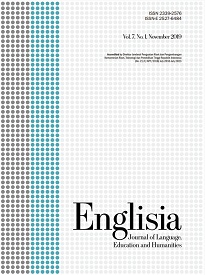THE WRITING AND SUPERVISION OF BRIGHT ENGLISH TEXTBOOK DEVELOPMENT FOR PRIMARY SCHOOL TEACHERS IN INDONESIAN CONTEXT
DOI:
https://doi.org/10.22373/ej.v7i1.5592Keywords:
Textbook development, 2013 curriculum, primary schoolAbstract
Although English Language subject is no longer compulsory for primary school level in Indonesia based on the current Curriculum 2013, some regions still consider it essential for their area development and thus making it a compulsory local content subject—Batu Municipality is one of them. Therefore, more efforts are needed to assist English teachers as resources for teaching English is limited due to the lack of support from the national policy level, thus the reasoning for the current project. This paper aims to describe the process of writing and supervising of Bright English Textbook, which is a specifically targeted English textbook for primary schools in Batu, East Java, Indonesia. Qualitative descriptive method was used in this study, involving four primary school teachers as the subjects in the collaborative textbook writing project. The finding presents the step-by-step process from the description during the training process, the actual writing process, until the illustration and lay-outing process. Besides, it also describes the supervision process as well as the problems and solutions related to it. Some highlights and implications of the study are also discussed, with suggestions offered in the form of combined online and face-to-face supervision process and sufficient writing and publication ethics training provided before the writing process begins. It is expected that this study could benefit other teachers and researchers who want to embark on a collaborative textbook writing process to improve their project effectiveness.Downloads
References
Chomsky, N. (1965). Aspects of the theory of syntax. Cambridge, MA: MIT Press.
Dewi, R. S. (2016). Penerapan pendidikan Bahasa Inggris dalam Kurikulum 2013 sekolah dasar. Retrieved from http://repository.uinjkt.ac.id/dspace/handle/123456789/30804
Even, R., & Olsher, S. (2014). Teachers as participants in textbook development: The Integrated Mathematics Wiki-book Project. In Mathematics curriculum in school education (pp. 333-350). Springer, Dordrecht.
Gallimore, R. & Tharp, R. (1991). A theory of teaching as assisted performance. In Light, P., Sheldon, S. & Woodhead, M. (Eds.), Learning to think: Child development in social context. London, United Kingdom: The Open University.
Hennessy, S., Haßler, B., & Hofmann, R. (2015). Challenges and opportunities for teacher professional development in interactive use of technology in African schools. Technology, pedagogy and education, 24(5), 1-28.
Hidayati, N. N. (2018). Pentingnya peningkatan kompetensi Bahasa Inggris bagi guru anak usia dini. Al-Hikmah: Indonesian Journal of Early Childhood Islamic Education, 2(1), 59-74.
Ivic, I. (1998). Sketch for one psychology of elementary school textbooks. Psychology in Teaching Journal. 1(1), 1-15.
Kosasih, E. (2014). Strategi belajar dan pembelajaran - implementasi Kurikulum 2013. Bandung, Indonesia: Yrama Widya.
Krashen, S. (1988). Second language acquisition and second language learning. New York, NY: Prentice Hall International English Language Teaching.
Madya, S. (2013). Metodologi pengajaran bahasa. Yogyakarta, Indonesia: UNY Press.
Magilvy, J.K. & Thomas, E. (2009). A First Qualitative Project: Qualitative Descriptive Design for Novice Researchers. Journal Compilations of Wiley Periodicals, 14(4), 298-300.
Maili, S. N. (2018). Bahasa Inggris pada sekolah dasar: Mengapa perlu dan mengapa dipersoalkan. JUDIKA (Jurnal Pendidikan Unsika), 6(1), 23-28.
McShine, J. (2011). Cognitive development: An information processing approach. Cambridge, United Kingdom: Basil Blackwell.
Mukundan, J., Hajimohammadi, R., & Nimehchisalem, V. (2011). Developing an English Language Textbook Evaluation Checklist. Contemporary Issues in Education Research, 4(6), 21-28.
Mustafa, F. (2018). How much do high schools contribute to improving students’ English proficiency? Seeking alumni’s perception in Indonesia. Asian EFL Journal, 20(2), 49-61.
OECD. (2016). Creating effective teaching and Learning environment: First Result from TALIS. Retrieved from https://www.oecd.org/berlin/43541636.pdf
Plut, D. (2013). Psychological-pedagogical assumptions for a theory of textbook (Unpublished Doctoral dissertation).
Poedjiastutie, D., Akhyar, F., Hidayati, D., & Gasmi, F. N. (2018). Does curriculum help students to develop their English competence? A case in Indonesia. AWEJ (Arab World English Journal), 9(2), 175-185.
Purwaningsih, S. (2013). Analisis perkembangan kurikulum Bahasa Inggris di Indonesia. IKIP PGRI Madiun retrieved from https://www.slideshare.net/CietieSpdf/analisis-perkembangan-kurikulum-bahasa-inggris-di-indonesia.
Putra, S. (2018). Pendidikan berbasis karakter dalam Kurikulum 2013. GEMA (Jurnal Pendidikan, Ekonomi dan Penyiaran Islam), 8(1), 1-19.
Radar Malang. (2018, January 14). Luar biasa, wisatawan ke Batu tembus 4,7 juta orang. Retrieved from https://radarmalang.id/luar-biasa-wisatawan-ke-batu-tembus-47-juta-orang/
Rifa’i, A. M. M. (2017). Pendidikan Bahasa Inggris dalam perspektif perenialisme. Al-Mabsut: Jurnal Studi Islam dan Sosial, 11(2), 36-50.
Santos, D & Miguel, L. (2016). Foreign Language Teachers' Professional Development through Peer Observation Programme. English Language Teaching, 9(10), 39-46.
Siegler, R.S. (2013). Information processing approaches to development: A manual of child psychology. New York, NY: Wiley.
Sofiana, N., Mubarok, H., & Yuliasri, I. (2019). English language teaching in secondary schools: An analysis of the implementation of Indonesian ELT 2013 Curriculum. International Journal of Instruction, 12(1), 1533-1544.
Sudrajat, D. (2015). Studi tentang pelaksanaan pengajaran bahasa Inggris di SD kota Tenggarong. CENDEKIA: Journal of Education and Teaching, 9(1), 13-24.
Tahir, S.Z. (2011). A stepping towards mastering English. Jakarta, Indonesia: Qalam Media Pustaka
Wertsch, J. (2011), Voices of the mind: A sociocultural approach to mediate action. Cambridge, MA: Harvard University Press
Downloads
Published
Issue
Section
License
Proposed Policy for Journals That Offer Open Access
Authors who publish with Englisia journal agree to the following terms:
- Authors retain copyright and grant the journal right of first publication with the work simultaneously licensed under a Creative Commons Attribution License that allows others to share the work with an acknowledgement of the work's authorship and initial publication in this journal.
- Authors are able to enter into separate, additional contractual arrangements for the non-exclusive distribution of the journal's published version of the work (e.g., post it to an institutional repository or publish it in a book), with an acknowledgement of its initial publication in this journal.
- Authors are permitted and encouraged to post their work online (e.g., in institutional repositories or on their website) prior to and during the submission process, as it can lead to productive exchanges, as well as earlier and greater citation of published work (See The Effect of Open Access).









